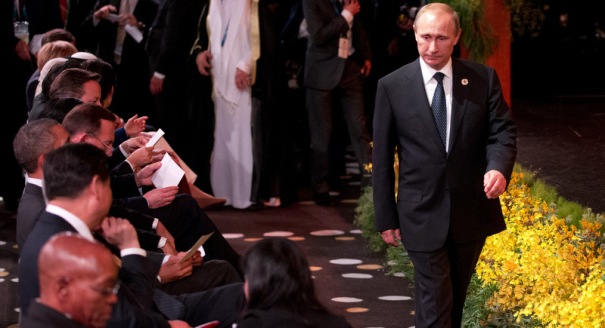In the new ideological cleavage that has opened up between Vladimir Putin’s Russia and Western countries, one idea divides them like no other: the meaning of regime change.
In the Western democracies, regime change is periodic and inevitable, part of the electoral cycle that removes one set of leaders and installs another. There is also a growing consensus that dictatorial regimes that face public protest and look to have lost their legitimacy no longer deserve support.
But it goes deeper than that. The Russian elite also genuinely believes that regime change sows instability in the world and is a bad idea per se. They look back to the Helsinki Founding Act of 1975 as a moment when the West and the Soviet Union agreed that part of the “rules of the game” was that existing regimes would be respected.
They present both Ukraine and Syria as two exhibits of the notion that Western countries have rejected the Helsinki consensus and are fomenting disorder everywhere from Kiev to Hong Kong. The way Syria has turned out, they say, vindicates the argument that United States was wrong to call for Bashar al-Assad to step down, because that led only to the rise of Islamic State. (At the same time, of course, they implausibly deny any Russian agency in events in either Syria or Ukraine).
In Russia’s post-Soviet neighborhood, the regime change question divides countries into two camps: Georgia, Moldova, and Ukraine, which have adopted the West’s model of change through elections; and other countries which cleave to Russia’s horror of the idea. (Kyrgyzstan looks to be the only “swing voter” in the middle.)
On this issue, Armenia and Azerbaijan, two countries that remain implacable enemies to each other, cling to the Russian view. Put simply, Russia provides an “insurance policy” for the elites in both countries that no one else can offer.
The Russian elite genuinely believes that regime change sows instability in the world.Tweet This
In Azerbaijan, an ideological turn against the West and closer to Russia has sharpened in the last nine months with a heavy crackdown against pro-Western opposition activists, non-governmental organizations and even such innocuous Western imports as the United States Peace Corps. Human rights defenders, lawyers and activists who challenged the ruling elite—most recently the country's best-known investigative journalist Khadija Ismailova—are in jail.
The beginning of the new Moscow-Baku consensus can probably be dated back to the election of 2012, when President Ilham Aliyev was elected for a third term after Putin did him a favor by refusing to revoke the Russian citizenship of a putative opposition candidate, the well-known film-maker Rustam Ibrahimbekov.
The Azerbaijani government has now put its ideological seal on this shift, with a 60-page manifesto by Soviet-era veteran and presidential chief of staff Ramiz Mekhtiev.
Using language that could have come from the Kremlin, it expresses regret about how the end of the Soviet Union spelled the end of the “bipolar world.” It also warns against the dangers of Western fifth columnists, and color revolutions instigated by the current Russian government’s usual suspects such as former U.S. Ambassador to Moscow Michael McFaul.
Mekhtiev writes, “Today many political scientists are observing that ‘color revolutions’ are becoming a threat in every region and are exclusively pursuing the goal of exchanging governments not to the liking of the United States with regimes that are controlled by them. All this is happening under the pretext of democratization and the desire to implement so-called ‘democracy programs’ in various countries, including the former republics of the USSR.”
Where Azerbaijan has a fully authoritarian system, Armenia has more of a hybrid model, being more of a one-party state with some authoritarian and some democratic elements. But the same fear of losing control dominates.
Yerevan and Baku have evidently decided that Moscow can shield them from any potential Maidan.Tweet This
A major reason why President Serzh Sargsyan signed up to Putin’s Eurasian Union project was political: had he rejected it, he had every reason to fear that the Kremlin would support Armenia’s “systemic opposition,” which is grouped around oligarch Gagik Tsarukian and former president Robert Kocharian, and which has its own close relationships in Moscow. Since then, Sargsyan got rid of his technocratic prime minister and installed a candidate, Hovik Abrahamian, who is more acceptable to the Russian model.
Both Yerevan and Baku, as well as the states of Central Asia, have evidently decided that Moscow can shield them from any potential Maidan or Arab Spring. They must also wonder what the Russian leadership wants in return.





